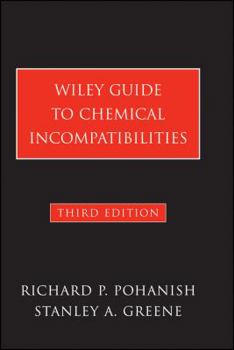Wiley Guide to Chemical Incompatibilities
?Inside Laboratory Management, on the Second Edition
"...a portable reference on reactive substances to guide all personnel...in charge of the handling, storage, and transportation of chemical materials."
?Journal of the American Chemical Society, on the Second Edition
The authoritative resource on dangerous chemical interactions now enlarged, revised, and even more useful.
The term "incompatibilities" describes a wide range of chemical reactions that produce undesirable results in noncontrolled situations: the generation of toxic gases, fire, explosions, corrosive activity, polymerization, ruptured containers, creation of more dangerous compounds, and the like. A portable and easy-to-use reference on reactive substances commonly found in commerce, the Wiley Guide to Chemical Incompatibilities, Third Edition compiles hard-to-find data on over 11,000 chemical compounds, providing chemists, technicians, and engineers a thorough, lightning-quick resource to use during experimental preparation and in the event of an emergency.
More than a revision of the previous edition, this Third Edition has been rewritten and expanded to broaden coverage and improve its usefulness. It contains nearly 9,000 chemical incompatibility profiles and nearly 250 new entries, covering flammability, violent and explosive binary reactions, incompatibilities, and reactions that may result from physical change. Alphabetical organization provides concise incompatibility profiles for thousands of commonly used commercial chemicals, allowing readers to look up a given substance and instantly learn whether it is incompatible with common materials, other chemical substances, structural materials, or personal protective equipment.
New for the Third Edition
Chemicals that have the potential to cause disasters Chemical formulas and autoignition temperatures More flash points, as well as molecular formulas, lower and upper explosive limits, autoignition temperatures, and NFPA(R)-type (Red) numerical fire codes Safety reminders All entries keyed by CAS numbers to eliminate possible confusion among synonyms Spanish-, French-, and German-language entries for international use Revised glossary helps users who may not be chemists with general chemical terms With thousands of new entries and easy-to-use organization, the Third Edition of the Wiley Guide to Chemical Incompatibilities remains a handy resource for all safety, first-response, and plant management professionals responsible for the handling, storage, and conveyance of chemical materials.




